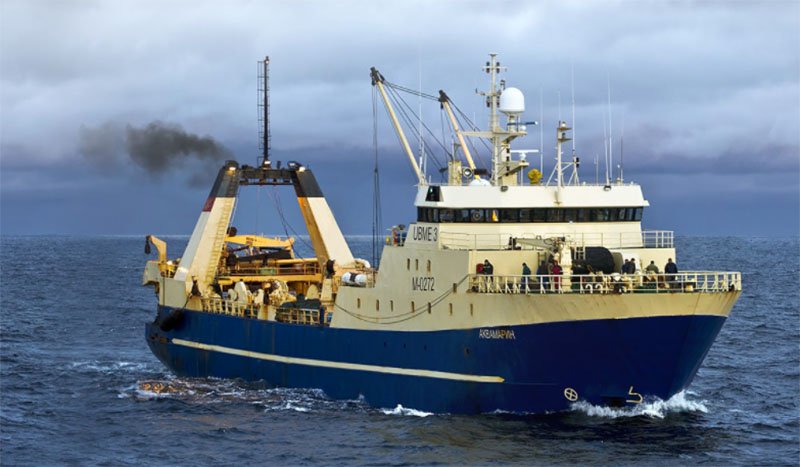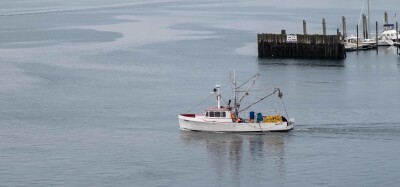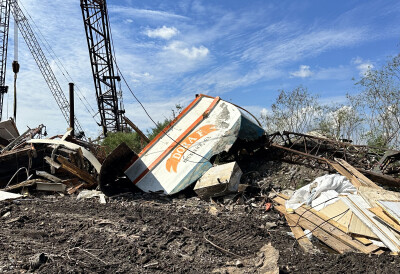(Bloomberg) — Peering into the mid-morning darkness from his sixth-floor office on Russia’s Kola Bay, Vitaly Orlov strains to see the new factory he’s just built across the water, his view obscured by a creeping cloud bank that shrouds the Arctic seascape in impenetrable gray.
The $30 million structure is the crown jewel of Orlov’s Murmansk-based Norebo Holding JSC. Set amid rows of aging tenements and a wooden church, it was built to service Norebo’s fleet of fish trawlers that together hauled in almost 11 percent of the 4.75 million metric tons (5.24 million U.S. tons) the Russian Federal Fisheries Agency says were caught by Russian fisherman last year.
“I’ve only ever been sure of one thing — that my life will always be tied to the north and the fishing industry,” Orlov, 51, polite and deliberate, pocket square tucked into a tailored suit, said in his first foreign media interview.
From that modest goal, Orlov has built a fortune that the Bloomberg Billionaires Index values at $1 billion, benefiting from the colliding forces of global trade and sanctions that today define Vladimir Putin’s Russia. While his business derives as much as 60 percent of its sales from outside the country, it’s also seen a surge in domestic consumption as sanctions limit food imports.
Arctic Calling
In the Nov. 8 interview, Orlov explained how the plant fulfills a lifelong aspiration to create a fully integrated global fishing operation. Imported Icelandic equipment will process 15,000 of the more than 500,000 metric tons of cod, haddock and other bottom-dwelling fish Norebo catches, packages and ships annually across the country’s 11 time zones and beyond.
Orlov took control of Norebo last year when one partner sold his share of the operation back to him, and a second was sentenced for trying to extort a stake of his own. The closely held business had $600 million of revenue in 2015, according to Orlov, and has $450 million of net debt issued to fund expansion and consolidate ownership. As a benefit of its dependence on exports, Norebo derives most of its revenue in foreign currencies and has most of its operating costs in rubles.
“He has an absolutely stable business with good margins,” said Eduard Klimov, who runs Fishnews, a research group and news portal based in the far eastern Russian city of Vladivostok. “Fish are a renewable resource that people will always eat.”
Bulldozed Imports
When Putin lashed out at the West three years ago for sanctioning the annexation of Crimea from Ukraine, he banned food imports from countries that had lined up against him. Tons of imported food was gathered, displayed and bulldozed in a global display of defiance.
Orlov’s export business was unharmed by the sanctions, which excluded food products, and Putin’s counter-measures led to a spike in domestic sales for Norebo-caught capelin, mackerel and herring.
“This showed that there was interest for Russian fish here,” Orlov said in a February 2016 interview to Kommersant, a Russian business daily. “And in the end it turned out that it is not worse than the Norwegian fish. Now they are getting used to our Pacific herring.”
Norebo’s business is further buttressed by a surging market for fish as consumers seek to add healthy protein to their diets, according to research from the United Nations, while the Norwegian Seafood Council reports that the price of cod specifically has risen by about 13 percent since 2013.
Ocean Trawlers
Orlov graduated from an engineering marine school in Murmansk with a navigator’s degree and a fluency in English in 1991, months before the Soviet Union and its command economy finally buckled, unleashing a free-market frenzy on an unprepared public.
More than 150,000 people — a third of the city’s population — left in search of better opportunities, with many relocating to St. Petersburg and Moscow. Orlov left at first too, heading west to Norway before being drawn back home by the Barents Sea, the body of water at the south end of the Arctic Ocean that Russians once called the Murman.
He was hired in 1993 by Magnus Roth, a former Swedish naval officer, to work for a Norwegian company selling cheap Russian fish across Scandinavia. Four years later, they started their own business in Norway called Ocean Trawlers, leasing Norwegian ships to Russian fishermen who were struggling with outdated Soviet-era boats. They managed the business in tandem, Roth explained in a 2011 interview with Norsk Fiskerinaering magazine. Roth managed sales and helped arrange loans from Western banks while Orlov ran the Russia operation.
Fresh Eyes
They were joined in 1998 by an acquaintance of Orlov’s, Alexander Tugushev, who graduated from the same Murmansk engineering school and became deputy head of the government body that oversaw the fishing industry.
“Magnus opened our eyes to how foreigners run the fishing business,” Tugushev, who worked as one of Ocean Trawler’s early barter partners, said in a separate November interview. “We were obsessed with the idea of creating the world’s largest fishing company.”
Tugushev was fired three years ago because he was “complicating” the company’s growth, Orlov said. Tugushev confirmed his “unexpected” dismissal and said in the interview he was an equal partner in the business. Orlov, who filed a complaint to police in August claiming 33 percent of Norebo was being extorted by “unidentified persons,” said Tugushev’s ownership claim is limited to one of the companies that were acquired during Norebo’s expansion.
House Arrest
Last month, the former fisheries official, who had re-joined Norebo in 2009 after serving a prison sentence for bribery, was placed under house arrest and charged with extortion regarding his ownership claims, according to a report from TASS, the government-owned news agency.
Tugushev declined to discuss his previous legal troubles, and hasn’t responded to requests for further comment since his arrest on Dec. 30. Darya Konstantinova, an attorney for Tugushev, said in a Jan. 24 message that the dispute is the result of a "conflict between business partners."
Roth, who didn’t reply to e-mailed requests seeking comment, sold his 33 percent stake of Norebo to Orlov last May for an undisclosed sum.
Norebo has spent about $600 million in the past decade to expand its fleet and its reach, Orlov said, adding that he thinks its true value is “much more moderate” than $1 billion. He cites “country risks” as the reason, most notably a lack of clarity about a new quota system the government is preparing to introduce favoring companies that order trawlers from Russian shipyards, a potential boon for newer, smaller businesses.
“I never imagined I could create such a huge company,” the former Soviet Army conscript said. “Now we want to be where the end-users are — retail chains, food services. We see potential here.”
Bloomberg News by Alex Sazonov







